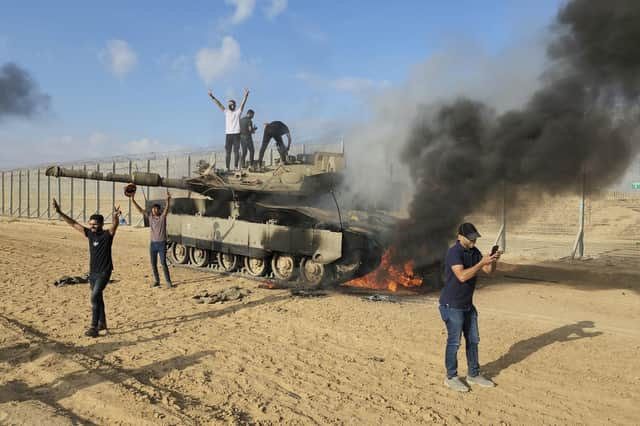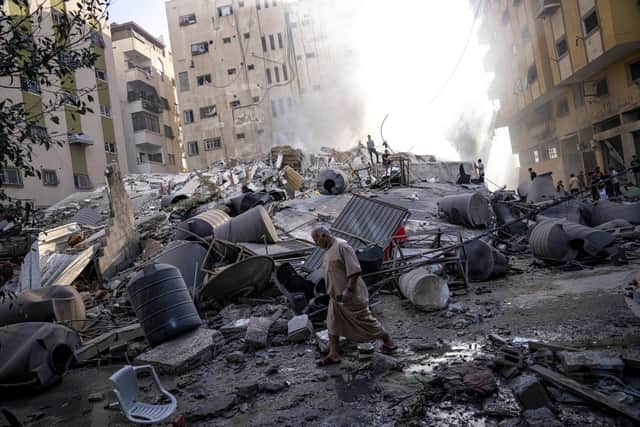Hundreds killed as Israel retaliates for Hamas attacks and rocket strikes


Hamas militants fired thousands of rockets and sent dozens of fighters into Israeli towns near the Gaza Strip in an unprecedented surprise early morning attack during a major Jewish holiday on Saturday, killing dozens and stunning the country.
Israel said it is now at war with Hamas and launched airstrikes in Gaza, vowing to inflict an “unprecedented price”.
Advertisement
Hide AdAdvertisement
Hide AdHamas militants were still fighting gunbattles inside several Israeli communities hours after the incursion began.


Israel’s national rescue service said at least 100 people were killed and hundreds wounded, making it the deadliest attack in Israel in years.
An unknown number of Israeli soldiers and civilians were also seized and taken into Gaza, an enormously sensitive issue for Israel.
At least 198 people in the Gaza Strip have been killed in Israel’s retaliation and at least 1,610 wounded, the Palestinian health ministry in Gaza said.
Airstrikes in the evening flattened a 14-storey residential tower that also holds Hamas offices in central Gaza City.
Israeli fired a warning just before, and the number of casualties was not immediately known.
The strength, sophistication and timing of the attack shocked Israelis.
Hamas fighters used explosives to break through the border fence enclosing the long-blockaded Mediterranean territory, then crossed with motorcycles, pickup trucks, paragliders and speed boats on the coast.
Advertisement
Hide AdAdvertisement
Hide AdBodies of dead Israeli civilians and Hamas militants were seen on the streets of Israeli towns.
Associated Press photos showed an abducted elderly Israeli woman surrounded by gunmen being taken back into Gaza on a golf buggy, and another woman squeezed between two fighters on a motorcycle.
Images on social media appeared to show fighters parading what seemed to be captured Israeli military vehicles through Gaza streets, and a dead Israeli soldier being dragged and trampled by crowd of Palestinians.
The assault threatened to spiral into a greater conflict, mirroring previous conflicts between Israel and the Hamas militants ruling Gaza that brought widespread death and destruction in Gaza and days of rocket fire on Israeli towns.
“We are at war,” Israeli prime minister Benjamin Netanyahu said in a televised address, declaring a mass army mobilisation. “Not an ‘operation,’ not a ‘round,’ but at war.”
“The enemy will pay an unprecedented price,” he added, promising that Israel would “return fire of a magnitude that the enemy has not known.”
The shadowy leader of Hamas’ military wing, Mohammed Deif, said the assault was in response to the 16-year blockade of Gaza, Israeli raids inside West Bank cities over the past year, violence at Al Aqsa – the disputed Jerusalem holy site sacred to Jews as the Temple Mount – increasing attacks by settlers on Palestinians and the growth of settlements.
“Enough is enough,” Mr Deif, who does not appear in public, said in the recorded message.
Advertisement
Hide AdAdvertisement
Hide AdHe said the morning attack was only the start of what he called Operation Al-Aqsa Storm, and called on Palestinians from east Jerusalem to northern Israel to join the fight.
“Today the people are regaining their revolution.”
At a meeting of top security officials Saturday, Mr Netanyahu said the first priority was to “cleanse” southern Israel of infiltrators, followed by a greater retaliation in Gaza.
The serious incursion on Simchat Torah, a normally joyous day when Jews complete the annual cycle of reading the Torah scroll, revived painful memories of the 1973 Mideast war practically 50 years to the day, in which Egypt and Syria launched a surprise attack on Yom Kippur, the holiest day of the Jewish calendar, aiming to take back Israeli-occupied territories.
Comparisons with one of the most traumatic moments in Israeli history sharpened criticism of Mr Netanyahu and his far-right allies, who had campaigned on more aggressive action against threats from Gaza.
Political commentators lambasted the government over its failure to anticipate what appeared to be a Hamas attack unseen in its level of planning and co-ordination.
Asked by reporters how Hamas had managed to catch the army off guard, Lt Col Richard Hecht, an Israeli army spokesman, replied: “That’s a good question.”
The Israeli military hit targets in Gaza in response for some 2,500 rockets that sent air raid sirens wailing constantly as far north as Tel Aviv and Jerusalem, some 50 miles away.
It said its forces were engaged in gunfights with Hamas militants who had infiltrated Israel in at least seven locations.
Advertisement
Hide AdAdvertisement
Hide AdThe abduction of Israeli civilians and soldiers raised a particularly thorny issue for Israel.
Their number was not immediately known.
Videos released by Hamas appeared to show at least three Israelis captured alive, and AP photos showed at least three civilians taken in Gaza, including the two women.
Israeli television showed images of a young man stripped down to his pants being led on foot in a chokehold and reported that elderly women with dementia as well as workers from Thailand and the Philippines were among the captives.
The Israeli military confirmed that a number of Israelis had been taken captive.
A top Hamas official, Saleh Arouri, told Al-Jazeera TV that his group is holding “a large number” of Israeli prisoners, including senior officers, adding that they will be used in a prisoner exchange to free Palestinian detainees in Israeli jails.
Neither side said how many. Israel has a history of making heavily lopsided exchanges in order to bring captive Israelis home.
The infiltration of fighters into southern Israel marked a major escalation by Hamas, forcing Israelis in the region to hunker down in safe rooms.
In the town of Sderot, the bodies of at least six people gunned down at a bus shelter were laid out on stretchers on the street.
Advertisement
Hide AdAdvertisement
Hide AdThe bags they had been carrying sat by the road and unmatched shoes were scattered on the pavement.
Elsewhere, an Israeli woman knelt in the street and embraced a dead family member whose body was stretched out next to a pink motorcycle that lay on its side.
The rider’s hand with a glove and a foot in a racing boot extended out from under the sheet.
In the kibbutz of Nahal Oz, just 2.5 miles from the Gaza Strip, terrified residents who were huddled indoors said they could hear constant gunfire echoing off the buildings as firefights continued.
“With rockets we somehow feel safer, knowing that we have the iron dome (missile defence system) and our safe rooms. But knowing that terrorists are walking around communities is a different kind of fear,” said Mirjam Reijnen, 42, a volunteer firefighter and mother of three in Nahal Oz.
In a televised address, Israeli defence minister Yoav Gallant warned that Hamas had made “a grave mistake” and promised that “the state of Israel will win this war”.
Western nations condemned the incursion and reiterated their support for Israel, while others called for restraint on both sides.
“The US unequivocally condemns the unprovoked attacks by Hamas terrorists against Israeli civilians,” said Adrienne Watson, spokeswoman for the US National Security Council.
Advertisement
Hide AdAdvertisement
Hide Ad“We stand firmly with the government and people of Israel and extend our condolences for the Israeli lives lost in these attacks.”
Ms Watson said Jake Sullivan, the national security adviser, has spoken to Israeli counterpart, Tzachi Hanegbi.
Saudi Arabia, which has been in talks with the US about normalising relations with Israel, released a statement calling on both sides to exercise restraint.
The kingdom said it had repeatedly warned about “the dangers of the situation exploding as a result of the continued occupation (and) the Palestinian people being deprived of their legitimate rights”.
The attack comes at a time of historic division within Israel over Mr Netanyahu’s proposal to overhaul the judiciary.
Mass protests over the plan have sent hundreds of thousands of Israeli demonstrators into the streets and prompted hundreds of military reservists to avoid volunteer duty, turmoil that has raised fears over the military’s battlefield readiness and raised concerns about its deterrence over its enemies.
It also comes at a time of mounting tensions between Israel and the Palestinians, who have felt increasing despair with the peace process effectively dead for years and no resolution to Israel’s occupation.
Over the past year Israel’s far-right government has ramped up settlement construction in the occupied West Bank, Israeli settler violence has displaced hundreds of Palestinians there, and tensions have flared around a flashpoint Jerusalem holy site.
Advertisement
Hide AdAdvertisement
Hide AdSaturday’s wide-ranging assault threatened to undermine Mr Netanyahu’s reputation as a security expert who would do anything to protect Israel.
It also raised questions about the cohesion of a security apparatus crucial to the stability of a country locked in low-intensity conflicts on multiple fronts and facing threats from Lebanon’s Hezbollah militant group.
Hezbollah congratulated Hamas on Friday, praising the attack as a response to “Israeli crimes” and saying the militants had “divine backing”.
The group said its command in Lebanon was in contact with Hamas about the operation.
Israel has maintained a blockade over Gaza since Hamas seized control of the territory in 2007. The bitter enemies have fought four wars since then.
The blockade, which restricts the movement of people and goods in and out of Gaza, has devastated the territory’s economy.
Israel says the blockade is needed to keep militant groups from building up their arsenals. The Palestinians say the closure amounts to collective punishment.
Nearly 200 Palestinians have been killed in Israeli military raids in the West Bank, which has seen heavy fighting. Israel says the raids are aimed at militants, but stone-throwing protesters and people uninvolved in the violence have also been killed.
Advertisement
Hide AdAdvertisement
Hide AdPalestinian attacks on Israeli targets have killed over 30 people.
The tensions have also spread to Gaza, where Hamas-linked activists held violent demonstrations along the Israeli border in recent weeks.
Those demonstrations were halted in late September after international mediation.